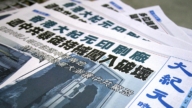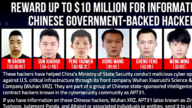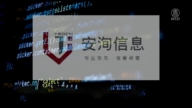【新唐人2013年01月09日訊】國際政治風險諮詢公司「歐亞集團(Eurasia Group)」,最新公布的「2013年全球十大風險」排名,中共當局如何控制信息的風險被排名第二。報告說,隨著一件件高官貪腐醜聞被揭露,中共在第一回合信息戰中已輸給人民,接下來,中共為避免不利信息影響到政權的合法性,很可能將人民的不滿情緒,導向「民族主義」,因此挑起對外衝突。
最新的「全球十大風險排名」報告中說,中國廣大的中產階級教育程度日漸提高,對信息的需要增加,中共當局已無法控制敏感信息的流通。報告說,隨著每一件高官的醜聞和腐敗案件的揭露,都宣告著中共已輸掉與人民第一回合的信息戰。
「中共政權的合法性」一直被外界質疑,而自中共篡政以來,從沒放棄對敏感信息的管控,近幾年,隨著互聯網的發展,中共對網路言論的管控也不斷加強,儘管不少網民因為發佈敏感信息被拘捕、勞教,但是,仍然阻止不了各類敏感信息的傳播。
大陸自由撰稿人劉逸明:「現在只要知情者在網路爆料,他這個事情很快就會..做為公共事件,還有一些敏感事件,像山西的水污染事件,官方最開始也是在極力控制,結果5天之後,還是被媒體所揭露,所以現在中共確定控制信息的能力是越來越弱了。」
「全球自由信息運動」創辦人張新宇指出,中共控制信息流通本身就是對人性渴求的壓制,早已激起中國民眾的不滿。
全球自由信息運動創辦人張新宇:「2013年是比較有看頭的一年,那麼今年的年初,就出現了,比如說《南方週末》這種事件,最新吧,今天(8號),又有幾百人到《南方週末》的門口去支持,像這種現象就說明瞭,中國老百姓以及學生已經對政府,把它們當作被騙、被忽悠的對像,已經憤怒到極點了。」
1月2號,廣東省委宣傳部部長庹震刪改《南方週末》新年特刊,報館編輯、記者罷工抗議﹔各界名人、學者聯署力撐;7號至8號,報館前聚集數百網民和讀者前去舉牌、獻花聲援,要求庹震下臺謝罪,並要求憲政改革、新聞自由、和言論自由。
「歐亞集團」總裁伊恩.佈雷默1月7號在一個電話記者會上說,「2013年,我們將會看到中國更多民族主義的表現,這是由於中共信息戰的直接後果,將明顯的影響到美中關係,讓國家資本主義看起來更有威脅性,也讓東海與南中國海發生衝突的機率升高,尤其是中國與日本的衝突。」
劉逸明表示,「民族主義」在中國確實奏效,比如跟美國或日本發生矛盾時,只要當局一鼓動,就會導致老百姓群情激憤,一致槍口對外。
劉逸明:「這個民族主義確實能夠讓中國人比較信服,轉移中國人民的視線,但是,民族主義它不可能完全轉移開,畢竟現在不是戰爭年代了,都是跟外國發生的一些爭端而已,所以大多數還是國內的矛盾會比較突出,老百姓的注意力更多還會關注中共這個統治集團。」
「全球自由信息運動」創辦人張新宇指出,當國內的矛盾演變到不可收拾的地步,威脅到中共政權的時候,它很可能發起對外的戰爭。
張新宇:「目前這場《南方週末》風波,我看不容易這麼熄滅,如果國內出現這種情況,越演越烈的時候,很可能就會挑起釣魚島打起來了,那麼大家的注意力就不在這裏了,就轉移目標,如果它挑起這種事端它也沒把握贏,所以今年還是有好戲看的。」
此外,「全球十大風險」排名第五的是有關日本的風險,其中提到,隨著中國與台灣、韓國的經貿關係改善,日本的技術和投資對中國的重要性已經不如以往,日本最近的選舉結果,以及東海島嶼爭端,都將使日本與中共的關係更為困難。
採訪編輯/李韻 後製/王明宇
China’s Information Control Ranks Second in World’s Top Ten Risks
Eurasia Group, the international political risk consulting
firm, has just published “the world’s top ten risks in 2013.”
China’s control of information is ranked second.
The report said that the news of high-ranking officials’
corruption scandals has been exposed one after another.
The Chinese Communist Party (CCP) was
defeated in the first round of information warfare.
In order to avoid adverse impact on the
legitimacy of the regime, the CCP is likely
to turn public discontent into “nationalism”.
It is thought that they may provoke a foreign conflict.
The latest top ten global risk report says the majority
of the middle class with better education in China
has increased their need for information.
The CCP is unable to control the
spread of sensitive information.
Exposing every high-ranking official’s corruption
is a defeat for the CCP in the information war.
The legitimacy of the CCP has long
been questioned by the outside world.
However, since the CCP seized power, it has
never given up control of sensitive information.
In recent years, with the development of the
Internet, the CCP strengthened its control.
Despite many Internet users being arrested or sent
to forced labor camps, it still has not managed
to prevent the spread of sensitive information.
Liu Yiming, freelance Chinese writer: “As long as it’s insiders
breaking the news on the internet, it becomes a public event.
There are some sensitive issues, such as the
environmental pollution incidents in Shanxi.
Officials tried their best to control the news.
After five days, media disclosed the incident.
Thus, the CCP’s ability to control
information is getting weaker.”
Zhang Xinyu, founder of the “Global Freedom of
Information Movement,” pointed out that
the reason the CCP controls the flow of information
is to suppress human nature.
The CCP has aroused the dissatisfaction
of the Chinese people for quite a while.
Zhang Xinyu, founder of Global Freedom of Information
Movement: “Worthwhile things are happening in 2013.
At the beginning of this year, it was
the “Southern Weekly “incident.
Hundreds of people went to the
agency’s front door in support.
This means Chinese people and students felt they were
being cheated by the government, and were very angry.”
On January 2, the Guangdong Provincial Party Committee
Propaganda Minister Tuo Zhen tampered with the
“Southern Weekend" New Year special edition.
Newspaper editors and reporters went on strike in protest,
Celebrities and scholars joined in,
co-signing a petition in support.
On January 7 and 8, hundreds of Internet users
and readers were in front of to the newspaper agency.
They were holding placards and flowers asking
Tuo Zhen to step down, and offer an apology.
They also requested constitutional reform,
freedom of the press, and freedom of speech.
Eurasia Group President Ian Bremer spoke in a
telephone press conference on January 7, 2013.
He said it is likely we will see more acts of Chinese
nationalism, as a result of the CCP information war.
This will significantly affect US-China relations,
and make capitalism be more threatening.
It also raises a possibility of conflict in the East China Sea
and South China Sea, especially with China and Japan.
Liu Yiming commented that nationalism works well in China.
When China had conflicts with the United States
or Japan, as long as the CCP agitated it a little,
the Chinese people would immediately unite together,
turning their internal anger toward the foreign country.
Liu Yiming: “Nationalism can really help to shift the
attention of Chinese people, but not completely.
This is because it is not a time of war, and there
are only small conflicts with foreign countries.
Domestic conflicts would be more obvious, and the
public attention will be more focused on the CCP.”
Zhang Xinyu, founder of Global Freedom of Information
Movement: “When domestic conflicts evolve into
irreversible threats to the Chinese Communist
regime, it is likely that it will launch a foreign war.”
Zhang Xinyu: “This Southern Weekly
incident is posing hard to quieted down.
If it becomes more significant, it might
provoke a fight over the Diaoyu Islands.
Then everyone’s attention will shift to there instead.
Even if it can provoke such an incident,
winning that war is uncertain.
Thus, this is a very good year and
we have a lot to look forward to.”
China’s conflict with Japan is ranked
fifth among the world’s top ten risks.
The report also mentioned China’s trade and economic
relations with Taiwan and South Korea having improved.
This has seen the importance of Japanese
technology and investment in China decreasing.
The outcome of Japan’s recent election and the
East China Sea island dispute will create more
difficulties in a Sino-Japan relationship.




























